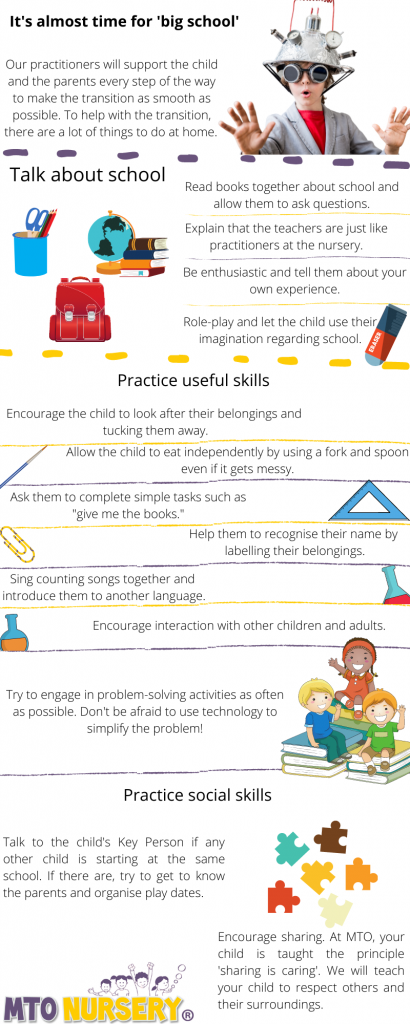[cmsmasters_row][cmsmasters_column data_width=”1/1″][cmsmasters_text]
The move from nursery to school is an important milestone for the child and you. Hence, our practitioners take many steps to prepare the preschoolers for ‘big school.’ So, through the support given, your little one will be ready for the big day.
Our staff will also provide all of the advice and reassurance needed for parents and carers. The goal is to make the transition as smoothly as possible for both parents and children.
We teach more than just numbers and letters
Your little one will need more than just acknowledging letters and numbers. Although such a skill is essential, they will need much more to do well at school. Thus, we will teach them independence and confidence.
Every Key Person will ensure that they work together with their children to build a range of skills so that the child will:
- Develop efficient communication so that they feel confident to make their feelings known to adults
- Build confidence so that the child will answer questions, even if the answer is wrong. As well as ask questions regarding any subject
- Have reasonable control over their behaviour and coping mechanism when emotions are running high
- Feel comfortable asking for the toilet, washing their hands, and dressing and undressing on their own
- Respect other children and adults, make friends and share their own
- Comfortably solve simple problems without help and be willing to try new tasks
At MTO, we use the latest teaching strategies to ensure that the children have the necessary skills and other helpful ones. For instance, our practitioners will count and sing in different languages such as Spanish and French.
Activities to prepare for the big day
Every day, we run a range of activities to help the little ones prepare for the school environment.
The children will follow a timetable, similar to a school one. They enjoy PE sessions and self-serve meals. We also practice lining up, putting shoes on, and taking them off. A variety of activities involve children sitting at a table and sharing resources with others.
At story-time, our practitioners talk about ‘big school’ and encourage children to ask questions. We encourage parents to do the same at home to help children get used to the idea.

Activities at home to prepare your child
For the child to feel comfortable in a school environment, they must be comfortable to do simple tasks with minimal help from the adults. You can support them by:
- Resisting the temptation to pop the child on the loo and wiping them. Through the support at the nursery, your child will gradually get in the habit of doing it themselves
- Avoiding buttons, buckles, or complicated accessories that will make it difficult for the child to get dressed without any help
- Allowing the child to put on their shoes, regardless of how long it takes. To speed up the process, you should think about purchasing Velcro-fasteners shoes
- Let the child open lunchboxes, cartons, and food packages by themselves. Furthermore, they should also use a knife and fork when necessary
- Encourage your child to solve simple problems by themselves. They should be able to let you know when they don’t understand how to solve the task ahead
Work on social skills
At the nursery, children interact and play with each other. The daily activities teach children to respect each other and their surroundings. This critical skill will make it easier for them to settle at ‘big school.’ To assist us at home, you should try the following:
- Organise play dates (preferably with other children at the nursery) – being around other children as much as possible will make the school environment less scary. If such action isn’t possible yet, virtual meet-ups are also a great option
- Roleplay – by the time the child starts primary, they should know how to say “hello” or greet others. Use soft toys and figurines to make it as real as possible
- Communicate – Speak with your child rather than at your child. Allow the little one to talk, ask questions, and also listen. The conversations should have an essence to them, so practice questions such as “how was your day today?”
- Encourage sharing – A good idea would be to play board games with the child. Ask questions such as “whose turn is it next?”
Practice early literacy and numeracy
Your child doesn’t have to have strong literacy and numeracy skills because it is what school is for! At home, you should start to get the child ready for learning by:
- Ensure that they recognise or react to their name – To make it easier for them to learn their name, you can keep clothes and footwear labelled
- Introduce them to numbers – Sing counting songs together or count objects around them. For instance, ask the child if they can bring a specific number of plates and cups for you at the dinner table
- Work on the fine motor skills – Let the child use scissors, beads and strings, and paint. This action will allow them to build stronger hand-eye coordination. At the nursery, we have many activities involving drawing, coloring, and mark-making
- Read stories – Reading will improve not only their vocabulary but also their listening skills
You should talk to your child about how exciting the next chapter will be. Allow your child to ask questions about what’s coming next and listen to their concerns or worries.
Conclusion
It’s normal for the child to be a bit anxious when it comes to changes. The best thing that you can do for your child is to focus on the positives and how fun it will be. Our practitioners are here to help you every step of the way to ensure a positive transition.
[/cmsmasters_text][/cmsmasters_column][/cmsmasters_row]